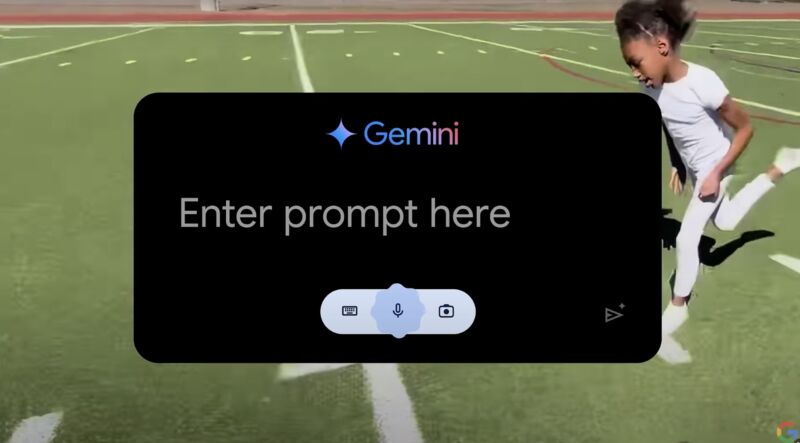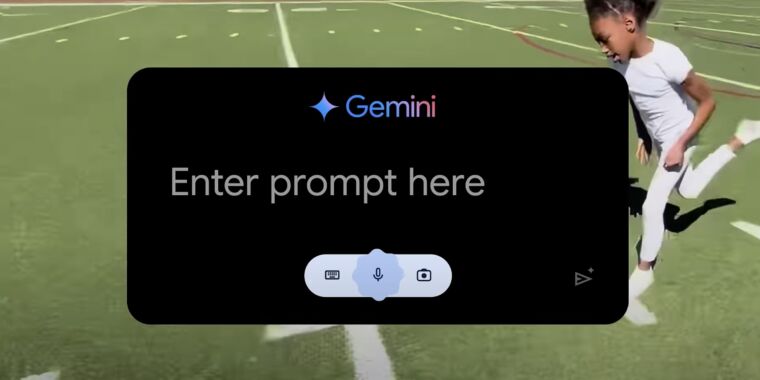
Have you seen Google's “Dear Sydney” ad? The one where a young girl wants to write a fan letter to Olympic hurdler Sydney McLaughlin-Levrone? To which the girl's father responds that he's “pretty good with words, but this has to be exactly right”? And so, to be exactly rightdoes he suggest that the daughter have Google's Gemini AI write a first draft of the letter?
If you follow the Olympics, you’ve no doubt seen it, because the ad has been everywhere. Until today. After a flurry of negative comments about the ad’s dystopian implications, Google has pulled the “Dear Sydney” ad from TV. In a statement to The Hollywood Reporter, the company said, “While the ad was tested well in advance of airing, given the feedback, we’ve decided to gradually phase it out of our Olympic rotation.”
The backlash was similar to that against Apple's recent ad, in which a giant hydraulic press crushed TVs, musical instruments, record players, paint cans, sculptures, and even emojis to create… the latest model of the iPad. Apple apparently wanted to show off the iPad's wide range of creative and entertainment possibilities; critics read the ad as a cautionary tale about the destruction of human creativity in an age of technology. Apple apologized shortly thereafter.
Now Google has stepped on the same landmine. Not only will AI replace human creativity, the “Dear Sydney” ad suggests, but it won’t even make room for the charming imperfections of a fan letter from a child to an athlete. Instead, AI will provide the template, just as it likely will provide the template for the athlete’s response, leading to a nightmare scenario in which vast swaths of human communication lose the “human” part entirely.
“Very bad”
The generally hostile tone of the commentary on the new ad was aptly captured in Alexandra Petri's Washington Post column about the ad, which Petri described as “very bad.”
This ad makes me want to throw a sledgehammer at the TV every time I see it. If I had a choice between watching this ad and watching the ad about how I need to donate money NOW to stop dogs from dying in the snow, I would have to think long and hard. It's one of those ads that makes you think, perhaps evolution was a mistake and our ancestors should never have left the seaThis may be a slight exaggeration, but only a slight one!
If you haven't seen this ad yet, you're living a blessed existence and I'd love to trade places with you.
An article on TechCrunch states that “it’s hard to think of anything that communicates less sincere inspiration than instructing an AI to tell someone how inspiring they are.”
Shelly Palmer, a professor and marketing consultant at Syracuse University, wrote that the ad's fundamental flaw was that it overestimated “AI's ability to understand and convey the nuances of human emotion and thought.” Palmer would rather have a “sincere message than a grammatically correct, AI-generated message,” he said. He then added:
Years ago, I received such a heartfelt message from a reader. It was a one-line email about a blog post I had just written: “Shelly, you need to [sic] stupid to own a smartphone.” I love this painfully ironic email so much, I have it framed and hanging on my office wall. It was honest, direct, and probably accurate.
But his conclusion was much more serious. “I reject outright the future that Google advertises,” Palmer wrote. “I want to live in a culturally diverse world where billions of individuals use AI to augment their human capabilities, not a world where we are used by AI pretending to be human.”
From there, things got even saltier. NPR host Linda Holmes wrote on social media:
This commercial where someone having a baby uses AI to write a fan letter to their hero SUCKS. Obviously there are special circumstances and people who need help, but as a general “look how cool she was, she didn’t even have to write anything!” story, it SUCKS. Who wants a fan letter written by AI?? I promise you, if they can do it, the words your kid can put together will be more meaningful than anything a prompt can spew out. And finally, a fan letter is a great way for a kid to learn to write! If you’re going to encourage kids to run to the AI to spit out words because they can’t write very well yet, how are they supposed to learn? Sit down with your kid and write the letter together! It just makes me so sick.
The Atlantic was more succinct with the headline: “Google Wins Gold Medal for Worst Olympic Ad.”
All of this largely lines up with our own take on the ad, which Ars Technica’s Kyle Orland called a “grim” vision of the future. “I want AI-powered tools to automate the most boring, mundane tasks in my life, so I can spend more time having creative, life-affirming moments with my family,” he wrote. “Google’s ad seems to imply that these life-affirming moments are also something to be avoided — or at least made more pleasantly efficient — through the use of AI.”
Getting people excited about their own aging and addiction is hard, so I don’t envy the marketers who have to peddle Big Tech’s biggest products in a climate of distrust and hostility toward everything from AI to screen time to social media to data collection. I’m sure the marketers will find a way, but “Dear Sydney” clearly isn’t it.

